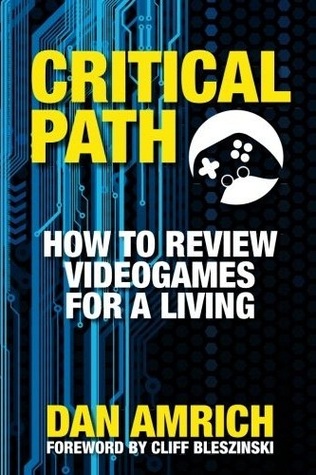
If you’re viewing this blog post, there’s a good chance you enjoy reading and writing about video games. Some among you may even want to pursue a career in video game journalism. However, reviewing video games isn’t an easy job. Sure, you will have access to the latest titles, but you’ll also write a lot, make very little money, and always be under the scrutiny of readers on the internet. On top of all that, it’s a very competitive field, and when you miss a deadline, there will be another eager writer waiting to take your spot. If you have no experience in the industry, you’re bound to have lots of questions, which is where Critical Path: How to Review Videogames for a Living comes in. Dan Amrich, coming from a background of over 15 years of working in the press (Official Xbox Magazine, GamePro, and GamesRadar), addresses all of these concerns, from how to write appealing reviews, how to attain a position as a game reviewer, and how to keep that dream job. It is both informative and engaging, and will appeal to both aspiring writers, and faithful readers who want to learn more about video game criticism and reporting.
To call Critical Path a “how to” book is simplifying what Amrich accomplishes. The lessons, which are divided into six sections, are the primary focus, but Dan’s personality comes across really well, and prevents the chapters from becoming a collection of dry instructions. He adds humorous experiences that are both insightful and entertaining, such as when a reader challenges a magazine by sending a resume that only mentions the games that he was able to beat quickly. This brief story emphasizes one of Amrich’s main arguments, “We need more writers who cover games and less gamers who think writing is a pretty cool job.” Game reviewers have to be writers first, and gamers second, because the former is what you’ll be doing most of the time. Writing is not a skill that everyone has. We, the audience, read to be informed, and the reviewer’s job is to inform us, which is why the person’s thoughts and feelings need to be made clearly. Dan Amrich shows his audience why these skills are important, and structures the book in such a way that is not overwhelming to the uninitiated.
If there’s one aspect of the book I felt could have been developed further, it’s the first chapter of the “Learning It” section. The “Test your Might” chapter provides a sample of a poorly written review. Dan Amrich analyses the flaws, and demonstrates how the review can be fixed, such as pointing out structural issues and implementing an active voice. It’s a helpful exercise, but I was disappointed that no example of a good review was provided. It’s true that the audience of Critical Path may have some exposure to professional reviews, but a few pages analyzing the positive components of a good review would have been enlightening to new writers. This omission felt particularly distracting in a later chapter, when Amrich shows several screenshots, and writes descriptions on why certain screens succeed and others fail. A similar “compare and contrast” explanation between sample reviews would have made the chapter stronger. However, should you have interest in purchasing Critical Path, do not let this one complaint deter you from doing so.
Before you ask, yes, Dan Amrich briefly mentions the “GerstmannGate” incident, but the book was published before Jeff revealed what really happened. The Kane & Lynch controversy isn’t discussed until much later in the book, where Amrich mentions his ambivalent thoughts on what may have occurred. It paints a complicated relationship between game reviewers, game publishers, and the audience. “You’re only as good as your last review,” Dan writes, and repeats throughout Critical Path. A game reviewer must be professional and consistent, because it is a career where you build and maintain relationships between the industry and with your audience. As readers, we see that dynamic from the perspective of the journalist, granting us a different point a view we may usually not consider.
Even if you don't want a job as a video game reviewer, the subject matter that surrounds the career is still captivating. The role of the media is something we readers often take for granted. It's too easy to jump on a forum and complain about a game's score being too low, but it's not easy to articulate whether or not a huge work is worth your money in a review (yes, including this review). So, yeah, I do recommend picking up Critical Path. I grew up reading Dan's work at GamePro, and the book alluded to a few of those issues, which I still have access to. And sure, while I may not have agreed with every review in the magazine, the amount of effort showed how much the staff cared about video games, just like in Dan Amrich's Critical Path.
Critical Path: How to Review Videogames for a Living is available digitally for $10 on both Kindle and iBooks, and in paperback for about $18. Dan Amrich is currently the Social Media Manager for Activision over at OneOfSwords.com, where you can see find his recent articles and weekly podcast.
Have any of you read the Critical Path?

Log in to comment